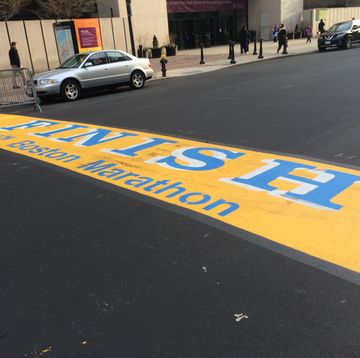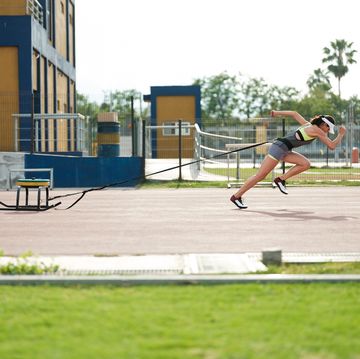Juli Benson, now at the Air Force Academy, is one of the few women who has coached pro runners.
Women coaches of elite athletes in the U.S. are in short supply. Ask around with the running cognoscenti, and they start groping for names. There's Juli Benson, of course, who coaches at the Air Force Academy and saw Jenny Simpson to her world championships gold medal in 2011. Magdalena Lewy Boulet oversees Chelsea Reilly's training, and Rose Monday has been a U.S. Olympic team assistant coach and looked after Maggie Vessey. Deena Kastor helps lead the Mammoth Track Club, but her husband, Andrew, does the coaching.
As of now, there is no female equivalent of Gagliano, Salazar, Schumacher or the Hanson brothers.
In 2012, the NCAA employed 3,974 female collegiate head coaches across all sports, its highest number yet, according to the longitudinal Acosta/Carpenter study, which has followed women's progress in intercollegiate sports for more than 35 years. With those numbers, you'd think a tiny percentage of those women would step up to coach runners at the elite level. And yet they're not. Why the disparity?
Lack of mentorship, the constant travel, low wages, and even low confidence are some frequent theories. And, a closer look reveals, those numbers in the college ranks--the obvious training ground for elite coaches--aren't as encouraging as they should be.
While the number of female coaches is at an all-time high, it hasn't kept pace with the growth of women's sports. The number of women coaching women's teams is at an all-time low. In 1972, 90 percent of women's teams had a female coach. By 2012, that number had plummeted to 43 percent. It gets bleaker for head coaching positions in Division I cross country and track and field programs, where women head up only 22.9 percent of women's track and 22.2 percent of cross country teams. Overall, women coach only 2 to 3 percent of men's teams.
Theories abound as to why this is: Maybe athletic directors don't trust women to do the job, or perhaps these women lack the credentials those ADs want to see. It's socially acceptable for men to coach women, but you'll rarely see the roles reversed, halving the opportunities for women coaches from the start. The societal slant especially binds female track and field coaches.
"Track and field often has combined men's and women's teams," says Celia Slater, co-director of the Alliance of Women Coaches and executive director of the NCAA Women Coaches Academy. "Because it's more socially acceptable for men to coach women and not the other way around, athletic departments are more likely to give the jobs to men."
Those male coaches aren't always fostering new talent among the ranks of their female assistants, either. The problem, says Maurica Powell, assistant cross country coach at the University of Oregon, is that women often get the role of team friend and go-between for the male coach.
"New, young women assistant coaches get trapped in a niche--pack the backpack, braid the hair, and make T-shirts for the conference meet," Powell says. "How exactly does that train you to coach an athlete to run 4 minutes in the 1500m? As an assistant coach, your objective should be to learn how to coach. Athletes don't need another friend; they need someone who will help them succeed."
If assistant coaches can find that mentor--Powell was lucky enough to have Vin Lananna as hers for four years--the job market is ready for them. Florida State University head cross country coach Karen Harvey says her assistant coaches could have their pick of jobs, with plenty of athletic directors seeking female coaches either because they want--or are pressed--to hire more. Without a mentor, however, both Harvey and Powell agree that many new female coaches who land the gig will be in over their heads.
"Can you imagine landing a job, and no one has taught you how to do it?" asks Powell. "You've set yourself up for failure, and then you're unsuccessful. Who do you call for help?"
Navigating the collegiate world as a female coach is already hard enough once you get there, Harvey reports. "When I walk around meets, I don't fit in," she says. "I'm not one of the guys. I don't give a damn, but some women do. A young woman in her 20s might not look forward to spending all of her weekends with a bunch of gossiping, middle-aged dudes."
Organizations like the Alliance of Women Coaches aim to change that atmosphere, through programs that support and educate NCAA women coaches. In addition to offering courses like managing programs, conflict resolution, communication strategies, and creating a positive environment, the alliance strives to be a place where women's voices can be heard. Currently, there's a wait list of 300 coaches to get into the next session.
Presumably, if numbers of women coaching track and field in college increase, numbers of elite coaches will follow suit. Graduates often want to stick with the person who brought them along in college. But there's a snag.
Elite coaching usually involves physical relocation. Athletes often train part of the year at altitude and race part of the year in Europe. Picking up and moving for an athlete's rotating schedule makes it nearly impossible to balance family life. No matter how much women lean in at work and men step up to share parenting, women usually do more of the day-to-day heavy lifting at home, and it's a stress that female coaches feel more acutely.
"I talk to Alberto Salazar every other day, and he's always somewhere else," Powell says. "College coaching and recruiting is already hard enough. I could never pull my kid out of school to go to Flagstaff for the winter or T-ball for a summer in Europe." As for Benson, when asked how she balances her life, she simply says she doesn't. It can't be balanced.
Perhaps the biggest roadblock to more women becoming elite coaches is their confidence, says Kathrine Switzer, pioneer of women's running. Slater agrees with that sentiment. She has found that in her experience, women will count themselves out of a job if they match only eight out of 10 requirements, figuring they're not up to snuff. Men, however, will apply for jobs they're only half-qualified for, Slater says.
"If they'd not been an elite runner themselves, some women feel unqualified to coach elites," says Switzer. "Guys don't seem to be bothered by it. Women need to give themselves the chance."













